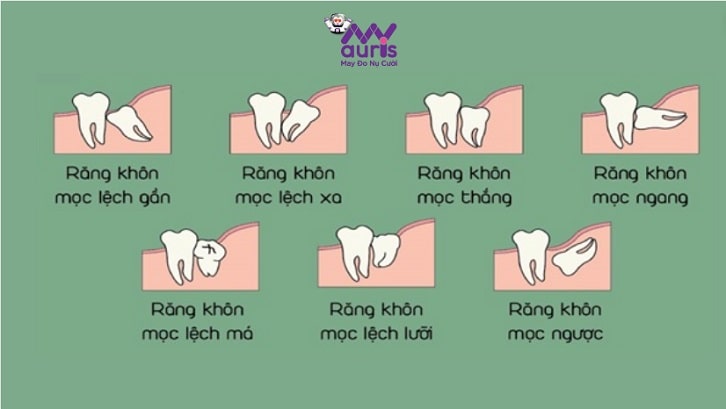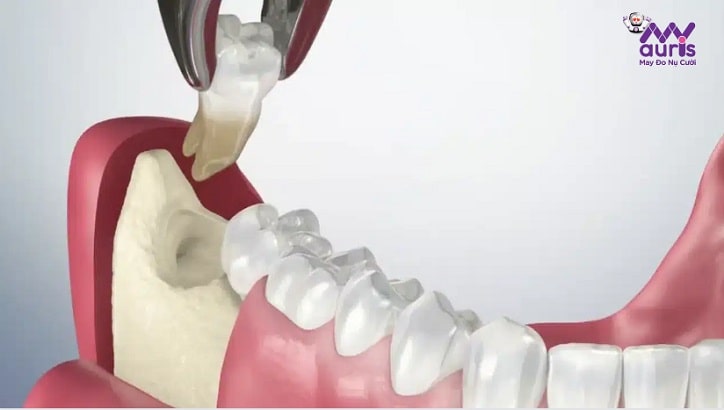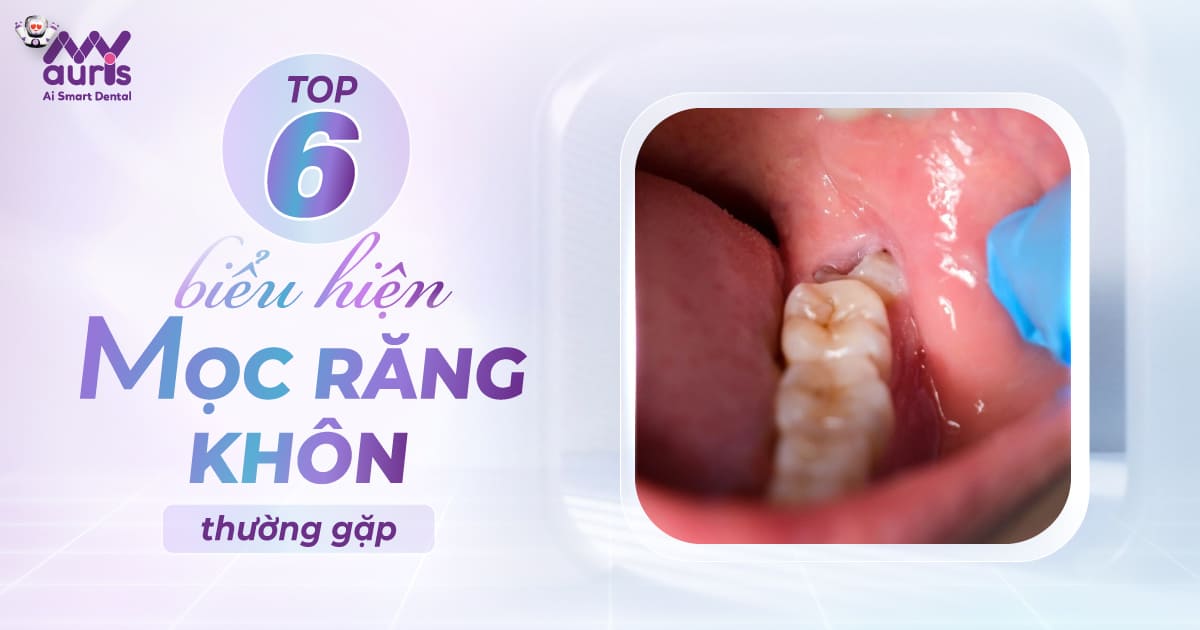Growing wisdom teeth is an obsession of many customers today. Furthermore, when wisdom teeth grow, they will be accompanied by other symptoms such as: pain, red, swollen gums, headaches, and fever. So how to show signs of wisdom teeth growing in cases of impacted or misaligned teeth? Today, My Auris Smart Dentistry will provide signs of wisdom teeth so you know accurately and proactively treat them.
When do wisdom teeth grow?
Wisdom teeth are the last molars to grow, and are the latest wisdom teeth to grow in adulthood from 18 to 25 years old when the roots begin to form. In some cases, wisdom teeth may grow normally or grow at a 45 or 90 degree angle. In a small number of cases, wisdom teeth grow underground in the bone or grow underground towards the jawbone, causing many oral health problems such as: pain, red and swollen gums on one cheek, and even difficulty opening the mouth.
Therefore, wisdom teeth cause a lot of trouble because they do not have a clear function but also cause a lot of trouble. Therefore, there are many conflicting opinions about whether wisdom teeth should be extracted or not.

Top 6 common manifestations of wisdom teeth growth
The manifestation of wisdom teeth growth will not occur continuously, it will depend on each person’s constitution. It usually takes 3-5 months for wisdom teeth to emerge from the gum surface. When wisdom teeth are about to grow, there will be different signs. Below are some common signs of wisdom teeth growth that you can refer to:
Prolonged pain
Toothache is the most common sign of wisdom teeth growth. The pain caused by wisdom teeth causes people who own them to experience many difficulties such as insomnia and loss of appetite. Usually, these pains last long or are intensely frequent as the teeth slowly emerge from the gum surface even when the wisdom teeth grow straight or are impacted.
Swollen gums
When in adulthood, the jawbone becomes firm and does not grow in size, so when there are signs of teething, the gums will stretch, which causes the gum surface to swell. This condition will last until the wisdom teeth have grown stably.
Difficulty moving the jaw
When wisdom teeth grow, you will feel heavy and have difficulty moving your mouth muscles such as communicating, chewing, etc.
Fever or headache
Many customers, when showing signs of wisdom teeth growing, the first question is, does wisdom teeth cause fever? In fact, mild teething fever often occurs when wisdom teeth are starting to grow. The cause of fever is body temperature rising higher than normal. However, don’t worry too much because these fevers are usually mild and do not last long. When the teeth are fully grown, the fever and headache will stop.
Loss of appetite due to prolonged pain
The reason you lose your appetite is partly because growing wisdom teeth makes swallowing painful, especially unable to open your mouth or your body is tired, causing you to suffer pain. ache. In addition, another common cause of loss of appetite is the inability to chew. When food is accidentally stuck in the gums at the position where wisdom teeth are about to erupt, it will cause pain, making it impossible to chew and feel the food.
Unpleasant breath >
When wisdom teeth move, it will cause damaged gum area. In addition, food plaque in the oral area will be difficult to clean. From there, it leads to an unpleasant odor in the oral cavity.

When is it necessary to remove wisdom teeth to ensure oral health
Most wisdom teeth, when they grow, bring difficulties or affect the patient’s life. However, there are still many conflicting opinions that make many customers wonder whether they should have their wisdom teeth extracted or not?
Some of the following cases require consideration of wisdom tooth extraction such as:
- Wisdom teeth grow crookedly and push adjacent teeth to cause symptoms such as pain, infection or affect neighboring teeth;
- Misaligned wisdom teeth often tend to cause food to get stuck in the interstices, making oral hygiene difficult. This will create conditions for bacteria to grow and form tooth decay. Therefore, they are often recommended to be removed to avoid affecting adjacent teeth;
- Growing wisdom teeth is accompanied by oral diseases such as periodontal disease or tooth decay;
In some cases whenDry teeth need to be extracted. Patients suffering from diseases such as cardiovascular disease, diabetes, bleeding disorders or teeth that affect important structures of the jaw such as nerves and blood vessels may be required to keep them. However, patients need to keep their teeth clean and take care of their wisdom teeth properly according to the doctor’s instructions.

How to take care of your teeth after wisdom tooth extraction
After wisdom tooth extraction, you need some time to recover, so you need to build a suitable oral care regimen. At the same time, limit the impact on the location of the tooth that has just been extracted. Some tips below can help the recovery process quickly and safely:
- Balance a suitable diet; After tooth extraction, you should use foods that are soft and easy to swallow such as porridge, soup, milk, etc. to avoid affecting the wound. In addition, supplement foods containing lots of vitamins, calcium, etc. Absolutely do not use hard, spicy foods as well as use carbonated or alcoholic drinks.
- Take time to rest: Take more time to rest. Besides, avoid vigorous activities that can affect the position of the newly extracted tooth. When you sleep, you can put a pillow high and avoid lying on your side, this will help limit pressure on the damaged area after tooth extraction;
- Proper oral hygiene: Brush your teeth regularly and avoid using antiseptic water. By preparing mouthwash after eating to remove plaque and leftover food. When brushing your teeth, be gentle and avoid the area where the tooth has just been extracted;
- Choose products to support teeth cleaning: Prepare a set of products including toothbrush, mouthwash, dental floss, etc. to support optimal teeth cleaning. You should choose safe and benign products to limit negative impacts on your teeth.
Hopefully the above detailed sharing aboutsymptoms of wisdom teeth growth. Thanks to that, you will have the mentality to prepare well financially before deciding to remove your wisdom teeth. Don’t forget to follow our next article to update many useful knowledge and chat with doctors at My Auris dental website as well as oral health.
Kim Dung





